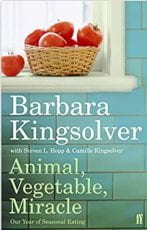
Barbara Kingsolver is a name appearing all over the place at the moment due to winning the Pulitzer Prize and the Women’s Fiction Prize with her most recent novel, Demon Copperhead. We chose Animal, Vegetable, Miracle as it describes a year in her family’s life where they chose to eat only locally produced food, much of which they grew themselves as they have land. The book is divided up into gluts of veg by month so July was courgettes (!), May was asparagus etc. but we were all particularly taken with her description of making mozeralla – apparantly it is quick and easy, you stretch it across your kitchen as part of the process and you stick it in the microwave to finish it off – and so a couple of the group might give it a try. We await the results.
There were foods that they had to do without and we did discuss what we would have to give up if we were to eat in this way. Kingsolver was pragmatic and so they did buy tea and coffee and we also wondered how far away is local – a 70 mile radius in their situation which is rural Appalachia in the US. We considered lemons, spices, red wine, chocolate but in actual fact apart from chocolate, we can grow more than we realised: ginger, tumeric, lemon grass, pepper corns etc although many of these are growing on the edge of their preferred conditions and often an indoor space is needed.
Eating your own food often means preserving gluts so that you have something to eat during the winter. None of us were wild about spending long hours in the summer slaving over a hot stove, although if the weather is like this August we might be glad of something to do other than be out in the rain. This way of living does take time and commitment and that might not be possible for all. We wondered how working people might find it, but in fact Kingsolver and her husband both worked during the year that they did this. She mentions in the book that it is about a mindset and prioritising this way of living. She probably didn’t watch much TV in the evenings.
Somehow, the kit you need to preserve foods came up: pressure cookers, dehydrators and fruit juicers. It turns out that you can get a dehydrator and fruit press from the Library of Things in Exmouth. You pay a small fee to join and then can borrow the items. What a wonderful idea.
Dotted throughout the book are snippets written by Kingsolver’s husband about the science of whatever she was talking about and her elder daughter’s point of view and recipes to match the gluts. These really enhanced the message being given in a book that was written in 2008 but still so relevant today.
Our next meeting is on the 19th of September 2023 in the community room on HL plots at 7pm and we are reading The Botanist’s Daughter by Kayte Nunn.
